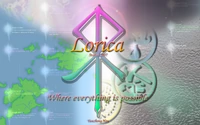|
--Bona al la encycla lorica.
Myths about magic[]
There are many myths (in this case meaning falsities specifically) about magic that exist in Lorica. These are the magic's myths or magia lora. In a world in which knowledge and access to power is paramount, how much one knows about what are myths and what are truths goes a long way in determining one's power and social status.
Synergy of magic[]
The Synergy of Magic is the belief that six elements (air, fire, earth, water, glass, and gold) can synergize with each other in certain ways so as to create exponentially increasingly powerful magic, culminating in ultimate High Magic that utilizes all six elements. This is an intentional rumor spread so as to convince aspiring magi to devote much of their life studying all six elements and the magic they each utilize, which is merely a dead end. This effectively prevents a great population of mage-wannabes from ever becoming one with any serious powers. Keeping them in the dark and convincing them that they are finding a path to their ultimate goal is by far the best method anyone has yet to come up with for keeping the populace in check, with or against their will. Of course, the six elements do each embody very different types of magic, but their only true relation to each other is that they were designed by The Hex Council centuries ago to keep others misinformed.
Magic is based on willpower, not inquiry[]
There is something to be said about the royalty's intention of keeping people in the dark as to how magic is "tapped into". Some hexes are best designed for use via willpower - for example, teleporting out when one believes acute danger is imminent is very conducive to self-preservation. However, this also comes across to any onlooker as magic being caused by willpower - a myth that the royalty is happy to keep alive. In reality, much scientific research is necessary for any magic to be implemented, and willpower is simply not relevant at all unless the spellcaster has been charmed with specific hexes that activate at will. This has lead to the very widespread belief that magic draws upon a mental "mana" source.
Magic is independently cast[]
Almost all people believe, out of their total ignorance and faith in their version of reality, that magic is independently cast - in other words, anyone can cast the spell if he/she knows how, and their spells will always come out the same, and the same spell must be cast whenever it is used. However, magic comes in an almost infinite variety, with the most potent of them all being the worldspell loricae. A worldspell is one giant hex that encompasses the entire world, and generally far more - whatever can be reached by the stars that conduct magic - and which interacts with other spells and reality on a grand scale. Loricae serves to empower or nullify certain other spells depending on the access level that the caster wields. So, either one follows within its hierarchy and is solely at the mercy of the government hierarchy, or they become rogue magi who try to circumvent loricae.
Magic has undesirable side effects[]
There is also the great belief that most magic cast has undesirable side effects, whether these be very obvious or hidden in the "fine print". Generally, magic is believed to come hand-in-hand with "fireworks", or displays of light, which are certainly not true. This mostly arises from civilians' observations that practically everything that happens is done without the aid of magic, and so their reasoning is, if someone had the power to use magic, wouldn't they use it a lot more frequently? Actually, some magic simply can't be done (like creating money out of thin air), and magi believe in a rule of minimal magical interference with nature and society (for many philosophical reasons). In reality, only rogue magi ever end up using magic with significant side effects because their magic is highly imperfect. For example, a spell to amplify one's hearing can also result in a dangerous ear infection, or could break one's eardrums. This imperfection not only makes them less able to use their spell arsenal but also makes them more notable. By contrast, royal magic is almost always perfected and so does exactly what you want it to do without doing anything you don't want it to do. This makes tracing and detecting high (royal) magic especially difficult.
Magic requires a "mana" source[]
Those who cast magic have a vested interest in others' believing that magic-casting is difficult for obvious reasons. One widely accepted belief that does exactly this is the belief that magic requires a "mana" source - either from the mind, or from the surrounding, or from the spirit, or from the body - to power. And when asked, those who can cast magic almost invariably don't tell the whole truth because the answer is not easy, nor is it easily believable to the ignorant masses. Hence, countless hours have been wasted by mage-wannabes searching for such elusive mana sources.
There are only so many types of magic[]
This is certainly untrue. A specific effect is coupled with a specific way of bringing about that effect, any filters or conditions for parts of that effect, other effects that may be related to or combined with it, and how to target that effect in time and place, among many other things. This leads to a flexible, infinite combination of spell affixes, almost all of which are specialized or artistic, for-the-occasion spells which must all be separately developed. It is this which uses up the brunt of the typical mage's time.

